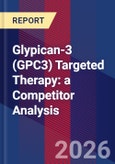GPC3, a GPI-anchored cell surface heparan sulfate proteoglycan, is an attractive target for hepatocellular carcinoma (HCC) immunotherapy because it is selectively expressed on HCC and promotes HCC cell growth and migration. GPC3 is rarely or not expressed in normal liver tissues, making it a perfect diagnostic and treatment target for HCC.
Liver cancer is the second leading cause of cancer-related deaths, and hepatocellular carcinoma is the most common type. Therefore, molecular targets are urgently required for the early detection of HCC and the development of novel therapeutic approaches. Glypican-3 (GPC3), an oncofetal proteoglycan anchored to the cell membrane, is normally detected in the fetal liver but not in the healthy adult liver. However, in HCC patients, GPC3 is overexpressed at both the gene and protein levels, and its expression predicts a poor prognosis.
GPC3 has been demonstrated as a viable target for CAR T-cell and NK cell therapy, T-cell and NK cell engaging bispecific antibodies, immune checkpoint bispecific antibodies, antibody-drug conjugates, radiopharmaceuticals and even vaccines while naked antibodies are of low interest. More than 20 product candidates are in clinical development and further eight at IND or IND-enabling stage.








